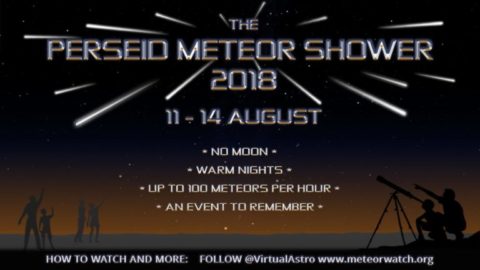UPDATE: Actually… You will see them anywhere in the sky, just watch for light trails.
Find somewhere dark on a clear night this weekend, away from light pollution, if you can, after 11pm or thereabouts. Look North East…find the constellation of Perseus (it’s just below the constellation that looks like a big stretched out letter W, Cassiopeia). The Perseids, as their name suggests will radiate from Perseus. At the peak, night of 12th August, you could be lucky and see them at a rate of one every minute for several hours.
VirtualAstro just got in touch to alert me to the fact that the Perseid Meteor Shower will peak this weekend. He has the skinny on when and how to watch. “I want to make things easy for people who haven’t done meteor spotting before,” he told me. “This year, I want people to easily understand how to meteor watch and spend more time looking up rather than down at their phones etc. Meteor showers are perfect for introducing people to stargazing and hopefully it will inspire more people to do it more regularly and get more and more people interested in science, nature and the night sky.”
There is a caveat though…it’s raining here right now after the longest hot and dry spell for many years, let’s hope the skies are clear again this weekend.
The Perseids are a prolific meteor shower associated with fragments from the comet Swift—Tuttle. They get their name from the radiant point at which they appear to emerge, which is seen in the constellation Perseus.
